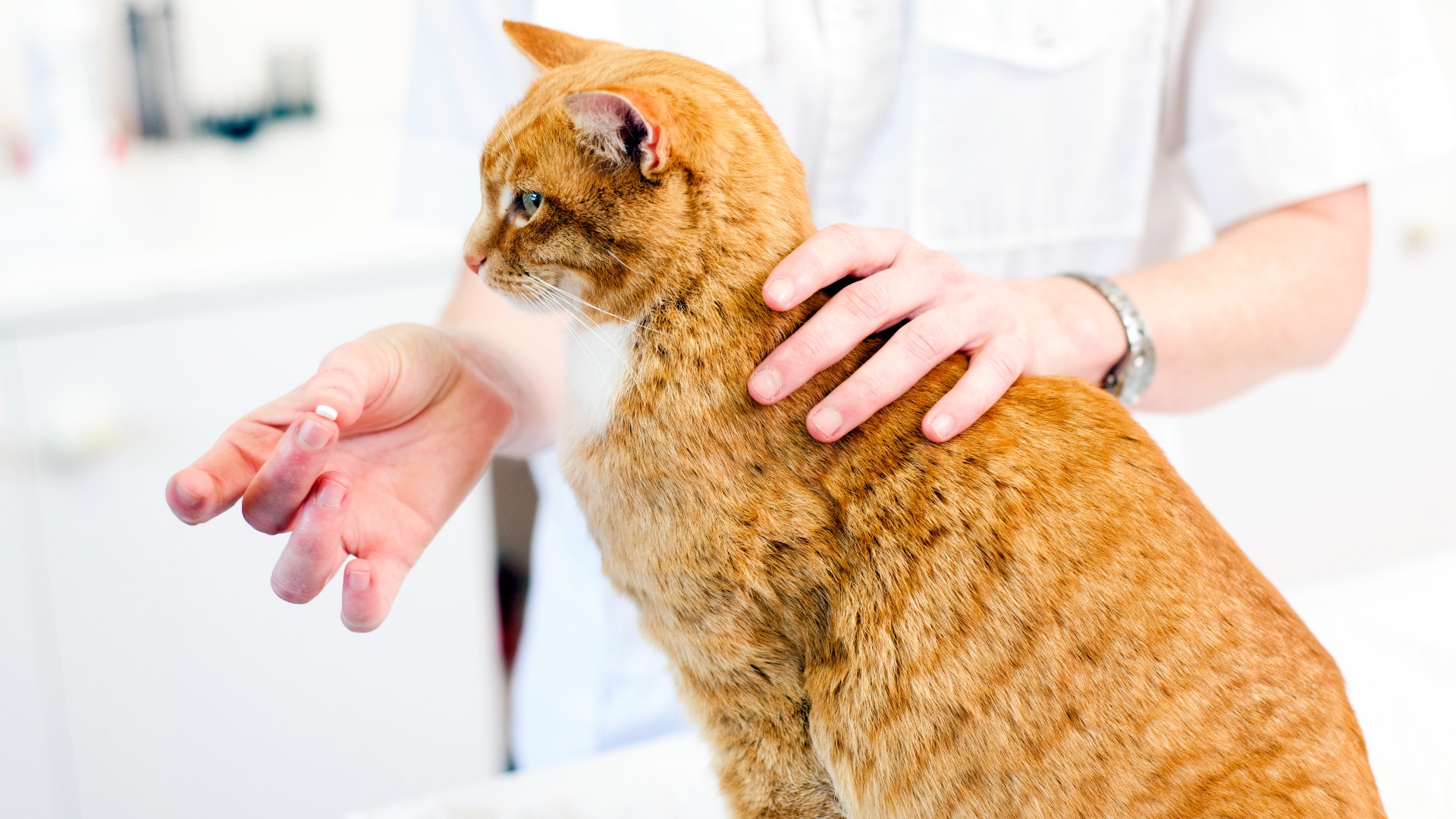Metronidazole for cats: Doses, side effects, and more
If your feline friend has recently been prescribed metronidazole for cats, here's everything you need to know....

Has your kitty been prescribed metronidazole for cats? It can be really confusing at the vet’s office, and often it’s hard to understand just what your pet is being prescribed and why. If you’ve come away with more questions than answers, you aren’t alone. You can always call your veterinarian back to go through their advice again, but we’ll discuss metronidazole for cats and its uses, benefits, and side effects here.
- Metronidazole for dogs: Vet’s guide to dosage and side effects
- What is the FVRCP vaccine for cats? Vet's guide to uses and side effects
Why do vets prescribe metronidazole?
Metronidazole is an antibiotic that is sometimes prescribed to animals, including dogs and cats. It works to interfere with the DNA of bacteria called anaerobes, which can survive without oxygen and are common in urine infections and some gut infections. As well as being an antibiotic, metronidazole also has activity against single-celled parasites called protozoa, so it is also used to treat infections of protozoa like Giardia.
There has been discussion about whether metronidazole can be used as an anti-inflammatory for the gut, and for this reason it is sometimes prescribed for IBD in cats. However, it’s not generally recommended to use metronidazole for IBD anymore as it risks antibiotic resistance and has a high chance of side effects due to the long-term dosing required. Because of the risk of antibiotic resistance, your vet might only prescribe metronidazole after testing which bacteria are present and which antibiotics work best (called a ‘culture and sensitivity’ test).
What is metronidazole for cats used for?
Metronidazole for cats is a useful antibiotic. It’s used to treat gut infections with bacteria like Clostridium and protozoa like Giardia, which cause diarrhea in cats. Metronidazole is also sometimes prescribed for skin, bone, urine, and wound infections, when the bacteria are likely to be anaerobic. Other uses of metronidazole for cats include:
- Hepatic encephalopathy (a liver disease causing neurological symptoms)
- Helicobacter (an uncommon bacterial infection of the stomach)
- Severe inflammation of the mouth (gingivitis-stomatitis)
Can metronidazole be prescribed to help cats with diarrhea?

Your vet might prescribe metronidazole for your cat if they have diarrhea, but only if the diarrhea is likely to be caused by Giardia, Clostridium, or other anaerobic bacteria. This will usually require a fecal sample to be sent to a laboratory to confirm whether the diarrhea is caused by an infection. If your vet finds these bacteria in your cat’s poop, then they may prescribe metronidazole.
Historically, metronidazole was also prescribed for cats with diarrhea without evidence of infection, including cats with IBD. This is because it was thought that metronidazole could calm down the immune system due to anti-inflammatory effects. However, it’s not recommended that we use metronidazole like this anymore due to the development of antibiotic resistance. In addition, IBD is a chronic (long-lasting) illness, and using metronidazole for a long period increases the risk of side-effects.
What parasites does metronidazole treat in cats?
Metronidazole can be used to treat protozoal parasites in cats. These are most commonly caused by a parasite called Giardia but other protozoa like Tritrichomonas fetus and Cryptosporidium may sometimes be the cause. Metronidazole treats all of these.
Get the best advice, tips and top tech for your beloved Pets
Metronidazole for cats dosage
It’s very important that metronidazole for cats is dosed accurately in order to avoid side effects. Your veterinarian will work out the appropriate dose for metronidazole based on your cat’s individual circumstances. In general, bacterial diseases will be treated with a dose of around 25-250 mg twice daily, depending on your cat’s weight. Giardia and some bacterial diseases may need a higher dose.
Does metronidazole have side effects in cats?
Absolutely! Like all drugs, metronidazole for cats can have side effects. While side effects are rare with careful dosing, the following may be seen:
- Vomiting
- Excessive salivation or foaming at the mouth
- Liver problems
- Low white blood cell count
- Bloody urine
In addition, severe and sometimes life-threatening neurological problems can occur, usually after long-term use or high doses.
Alongside this, metronidazole may cause cancer with chronic use and also shouldn’t be given in pregnancy as it may have toxic effects on the fetus.
How to administer metronidazole for cats

Metronidazole for cats is usually given as a tablet, or sometimes as a liquid. You should ask your veterinarian for advice to ensure you’re dosing properly. You can hide metronidazole in a small piece of food if this makes it easier to give it to your cat.
If you miss a dose of metronidazole, give it as soon as you remember and continue giving it every 12 hours. Do not give an extra dose of metronidazole to your cat if you missed a dose.
In some cases, metronidazole is given via an intravenous drip. Your cat will have to stay in the hospital if metronidazole is to be administered like this.
How long does metronidazole take to work on cats?
How long metronidazole takes to work on cats depends on the condition being treated. A course of metronidazole for cats is usually 5-7 days, but your vet might need to adapt this for your cat’s individual circumstances. If it’s going to respond, the infection will usually be gone by the end of the course. However, the damage caused by the infection means that the symptoms can continue for a long time even after they are gone. This is especially true for gut infections, where the damage to the gut lining means that your cat may have diarrhea for several weeks after the infection has cleared.
How to tell if metronidazole is working
It can be difficult to tell if metronidazole is working for your cat, as we don’t necessarily expect symptoms to immediately improve. However, your cat’s symptoms shouldn’t be getting worse when they’re taking metronidazole – if they are, it’s time to call your vet. Your vet will often recommend repeated testing to ‘prove’ that the infection has gone. A fecal sample a few days after the course has finished is usually a good idea.
Alternatives to metronidazole for cats
Depending on what your vet is treating, there may be an alternative to metronidazole for cats. If your vet is treating a bacterial infection, some other antibiotics also work on anaerobic bacteria. If your cat has Giardia, some wormers can also work against this parasite. Metronidazole isn’t commonly used for cases of IBD anymore as long-term use is likely to result in side effects. Instead, vets might prescribe steroids or low-dose chemotherapy which help to keep the IBD under control.
Conclusion
Metronidazole for cats is a useful drug that can treat a number of bacterial infections and parasite infestations. Although it can have side effects, these are generally uncommon with careful dosing. If you’re unclear about why your cat has been prescribed metronidazole, how to give metronidazole to cats, or whether your cat has side effects of metronidazole, you should contact the prescribing veterinarian for advice.
After graduating as a vet from the University of Nottingham in 2016, Dr. Joanna Woodnutt went on to practice companion animal medicine in the Midlands. She quickly developed a love of consulting and helping clients with medical problems such as dermatology, behavior and nutrition - anything that involved helping clients understand their pets better.
Jo started writing about pet health in 2017, realizing that it meant she could help even more pet parents. Since then, she has written for countless online and print publications and is a regular contributor for Edition Dog Magazine. Jo is the director of The Veterinary Content Company, which she founded in 2020. She is also the founder of Petlearnia, a platform that provides pet e-learning courses for pet parents.
Jo now lives in the Channel Islands with her husband Ian and terrier Pixie.

